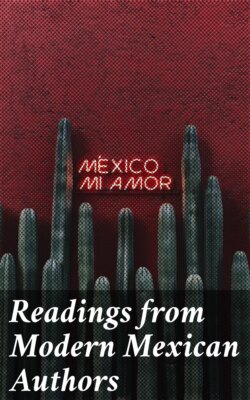Читать книгу Readings from Modern Mexican Authors - Группа авторов - Страница 21
На сайте Литреса книга снята с продажи.
BACKWARDNESS OF MEXICO IN VICEROYAL TIMES.
ОглавлениеTable of Contents
My lack of pecuniary resources does not allow me to give greater bulk to this book by translating Document I. from Latin into Spanish; but those who know the Latin language and philosophy will observe that in the Department of Physics in the College of Santo Tomás in Guadalajara were taught the first cause, the properties of secondary causes, supernatural operations, the sacrament of the Lord’s Supper, eternity—everything, in fact, save physics. Neither the word heat, nor the word light, is met with once in the program. The program cited, further accentuates ignorance of modern logic and modern metaphysics. Such was the teaching of philosophy by the Jesuits in the schools of New Spain, until the end of their instruction and existence in this country, since the public acto, in the College of Santo Tomás, took place in 1764, and three years later they were expelled (June 25, 1767). History proves that the Jesuits were at the front in teaching in the colleges of New Spain, and if they taught such things, what could those teach who were in the rear?
Lucas Alaman, Adolfo Llanos, Niceto de Zamacois, Ignacio Aguilar y Marocho, and other writers, open partisans of the colonial government (few indeed in this nineteenth century) to such documents as form the matter of this Dissertation reply: “It was the logic, the metaphysics and the physics of that epoch.” The statement is false and one might say that the writers mentioned were ignorant of history, or that, knowing it, they made sport of the credulity and good faith of their readers, were it not that the intelligence and honesty of the four writers—and of others—is well established, and did not logic teach us that there are other sources of error in judgment besides ignorance and bad faith; that a great source of errors is preoccupation, as that of Alaman and Aguilar Marocho—for all that concerns the monarchy and viceroyalty; and a great source of errors is passion, vehement and uncontrolled, as the love of country which sways Zamacois, Llanos, and other Spanish writers.... The statement is false, I repeat, and, in consequence, the conclusion is nul: nulla solutio. I shall prove it.
The discovery of the New World, the origin of the Americans and their magnificent ruins and antiquities, scattered over the whole country; the Aztec civilization, grand in a material way; their human sacrifices, which in fundamental meaning involved a great genesiac thought and in application were a horrible fanaticism; the Conquest of Mexico, in which present themselves:—Hernan Cortes, the first warrior of modern times, though with indelible stains; Pedro de Alvarado, Gonzalo de Sandoval, Cristobal de Olid, and Diego de Ordaz, with their feats of heroism and their crimes; Cuauhtemotzin, Xicotencatl, Cacamotzin, and the other Indian warriors with their immortal patriotism; the interesting figure of Marina; Bartolomé de Olmedo, Pedro de Gante, Bartolomé de las Casas, Juan de Zumárraga, Toribio de Motolinia, Bernardino de Sahagun, and the other missionaries surrounded by an aureole of light which brings posterity to its knees; all the conjunct of the Conquest, as the finest subject for an epic poem; “the Laws of the Indies,” the encomiendas, the Inquisition; Antonio Mendoza, the venerable Palafox, Fray Payo Enriquez de Rivera, the Duke of Linares, Revilla Gigedo the second, and other excellent viceroys; the fecund events of 1808; the Revolution of the Independence, the first and second empires, and many other events in the history of Mexico during its five epochs, have already been treated and ventilated in many books, pamphlets and journals—some sufficiently, others overmuch. Poetry in New Spain has been magnificently treated by my respected friend, the learned Francisco Pimentel, in Volume I. of his Historia de la Literatura y de las Ciencias en Mexico. But Philosophy in New Spain is a subject that has not been specifically treated by only one. This work has, perhaps, no other merit than novelty, which would be worth nothing without truth, supported by good testimonies. As regards Spain I shall take my testimonies from no foreign authors—lest the bourbonist writers might reject them as disaffected and prejudiced, and so shield themselves—but from Spanish writers; with the exception of one and another Mexican, accepted by all Spaniards as trustworthy, such as Alzate and Beristain.... And among Spaniards I will refrain from citing Emilio Castelar and others of the extreme left.
